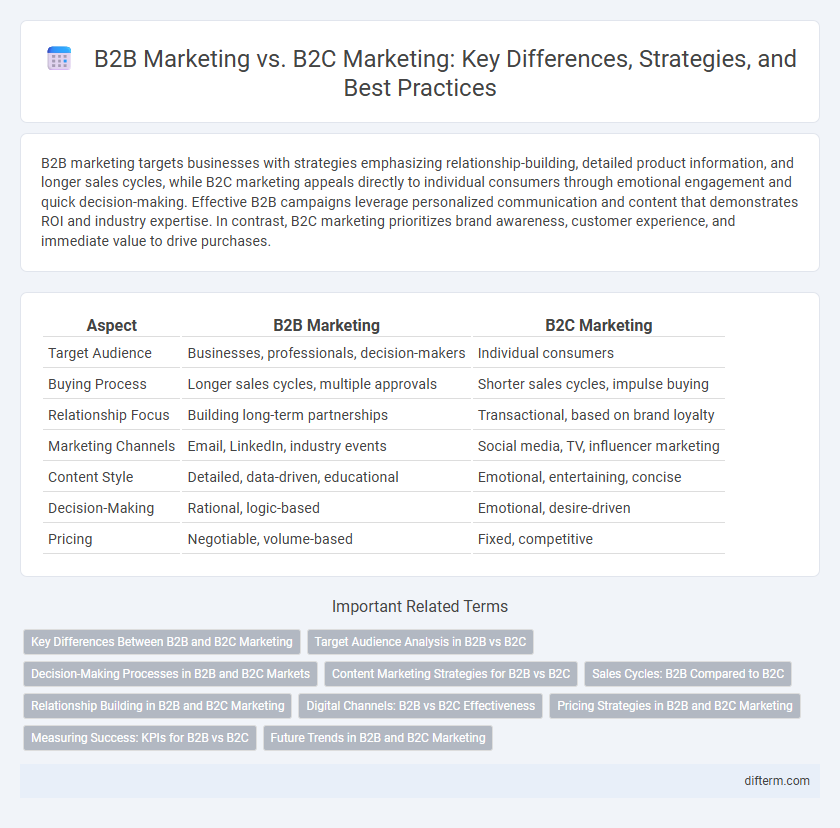B2B marketing targets businesses with strategies emphasizing relationship-building, detailed product information, and longer sales cycles, while B2C marketing appeals directly to individual consumers through emotional engagement and quick decision-making. Effective B2B campaigns leverage personalized communication and content that demonstrates ROI and industry expertise. In contrast, B2C marketing prioritizes brand awareness, customer experience, and immediate value to drive purchases.
Table of Comparison
| Aspect | B2B Marketing | B2C Marketing |
|---|---|---|
| Target Audience | Businesses, professionals, decision-makers | Individual consumers |
| Buying Process | Longer sales cycles, multiple approvals | Shorter sales cycles, impulse buying |
| Relationship Focus | Building long-term partnerships | Transactional, based on brand loyalty |
| Marketing Channels | Email, LinkedIn, industry events | Social media, TV, influencer marketing |
| Content Style | Detailed, data-driven, educational | Emotional, entertaining, concise |
| Decision-Making | Rational, logic-based | Emotional, desire-driven |
| Pricing | Negotiable, volume-based | Fixed, competitive |
Key Differences Between B2B and B2C Marketing
B2B marketing targets businesses and emphasizes relationship-building, detailed product information, and longer sales cycles, while B2C marketing focuses on individual consumers, impulse buying, and emotional appeal through brand storytelling. B2B campaigns rely on logical decision-making driven by ROI and efficiency, whereas B2C favors customer experience, convenience, and emotional triggers to drive quick purchases. Key differences include target audience complexity, sales process duration, and communication strategies tailored to professional versus personal needs.
Target Audience Analysis in B2B vs B2C
B2B marketing target audience analysis centers on identifying business decision-makers, understanding industry-specific needs, and evaluating organizational buying processes. B2C marketing focuses on individual consumer behavior, preferences, demographics, and emotional triggers influencing purchasing decisions. Precise segmentation in B2B involves company size, role, and purchase intent, whereas B2C emphasizes lifestyle, age, and consumer trends.
Decision-Making Processes in B2B and B2C Markets
B2B marketing involves complex decision-making processes characterized by multiple stakeholders and longer sales cycles, emphasizing detailed product specifications, return on investment, and relationship building. In contrast, B2C marketing features quicker decision-making driven by individual emotions, brand perception, and immediate benefits, often influenced by social proof and convenience. Understanding these distinct decision dynamics enables marketers to tailor strategies effectively, targeting detailed information for B2B buyers and emotional triggers for B2C consumers.
Content Marketing Strategies for B2B vs B2C
B2B content marketing strategies prioritize in-depth whitepapers, case studies, and industry reports to build credibility and educate decision-makers over longer sales cycles. B2C content marketing emphasizes engaging, visually appealing, and emotionally driven content such as social media posts, videos, and influencer collaborations to capture immediate consumer attention. Tailoring content to the specific buyer's journey in B2B involves detailed problem-solving information, while B2C targets quick value and brand connection for mass appeal.
Sales Cycles: B2B Compared to B2C
B2B marketing typically involves longer sales cycles, often spanning several months due to multiple decision-makers and detailed contract negotiations. In contrast, B2C marketing benefits from shorter sales cycles, driven by individual consumer decisions and impulse buying behavior. Understanding these distinct timelines is crucial for tailoring effective marketing strategies and resource allocation in both sectors.
Relationship Building in B2B and B2C Marketing
B2B marketing emphasizes long-term relationship building through personalized communication, trust development, and ongoing collaboration between businesses, resulting in higher customer retention and lifetime value. In contrast, B2C marketing focuses on creating emotional connections, brand loyalty, and quick purchase decisions through targeted advertising and customer engagement strategies. Effective relationship management in B2B relies on detailed client knowledge and tailored solutions, whereas B2C leverages broad consumer insights and mass marketing techniques.
Digital Channels: B2B vs B2C Effectiveness
B2B marketing leverages digital channels such as LinkedIn, industry-specific forums, and email campaigns to target decision-makers and foster long-term relationships, emphasizing content that provides value and demonstrates expertise. B2C marketing prioritizes broader reach through social media platforms like Instagram, Facebook, and TikTok, focusing on high-impact visuals, influencer partnerships, and emotional engagement to drive immediate consumer action. Data shows B2B campaigns achieve higher conversion rates on LinkedIn due to precise targeting, whereas B2C campaigns excel in brand awareness and quick sales on social channels with vast consumer audiences.
Pricing Strategies in B2B and B2C Marketing
B2B marketing pricing strategies emphasize long-term value, customized pricing models, and volume discounts to build strong client relationships and accommodate complex purchasing processes. B2C marketing relies heavily on competitive pricing, promotions, and psychological pricing techniques to attract individual consumers and drive immediate sales. Understanding these distinct approaches enables marketers to tailor pricing strategies that optimize revenue generation and customer satisfaction in each market type.
Measuring Success: KPIs for B2B vs B2C
B2B marketing success is often measured through lead quality, conversion rates, and customer lifetime value, emphasizing long-term relationship building and sales cycle length. In contrast, B2C marketing focuses on metrics like brand awareness, engagement rates, and immediate sales volume to capture consumer attention quickly. Both strategies utilize data analytics and ROI tracking but prioritize different KPIs aligned with their unique buyer behaviors and decision-making processes.
Future Trends in B2B and B2C Marketing
Future trends in B2B marketing emphasize personalized account-based strategies, AI-driven data analytics, and enhanced automation to streamline lead generation and customer engagement. B2C marketing is increasingly leveraging immersive technologies like augmented reality, social commerce, and influencer partnerships to deliver tailored consumer experiences and boost brand loyalty. Both sectors are expected to prioritize sustainability and ethical marketing practices to meet evolving consumer and business expectations.
B2B marketing vs B2C marketing Infographic

 difterm.com
difterm.com